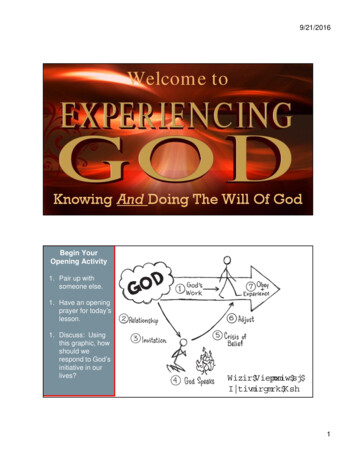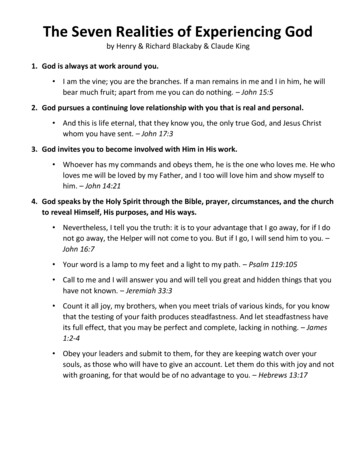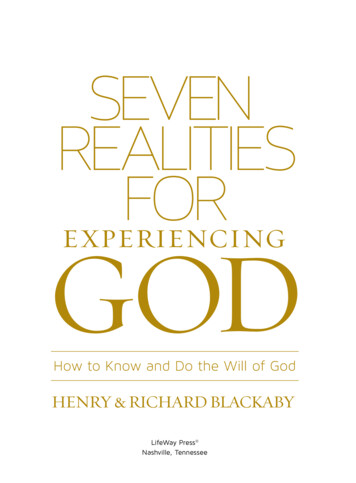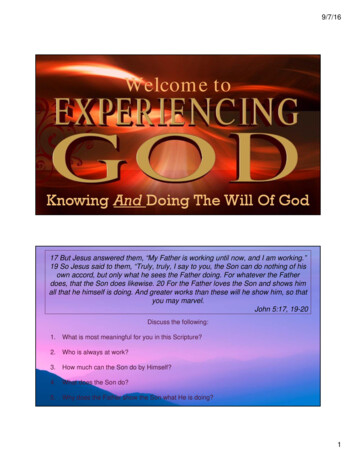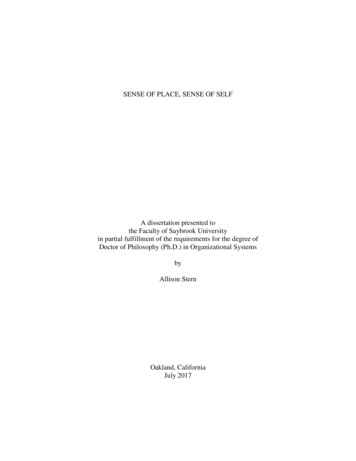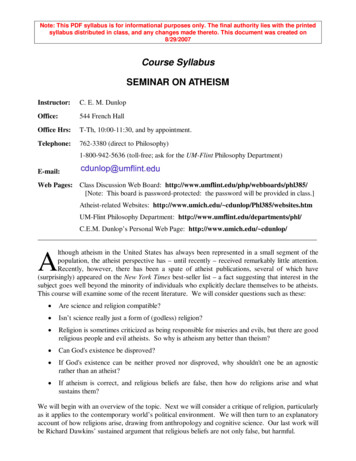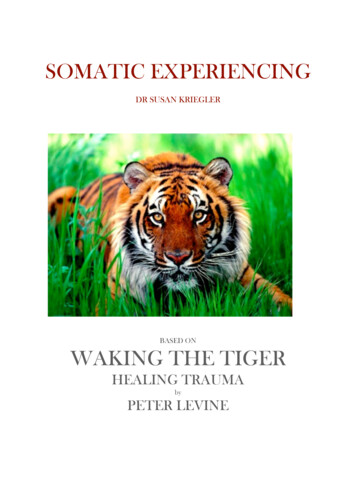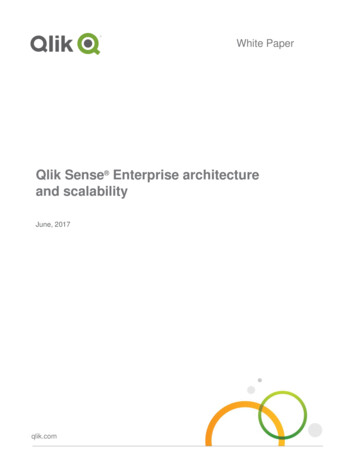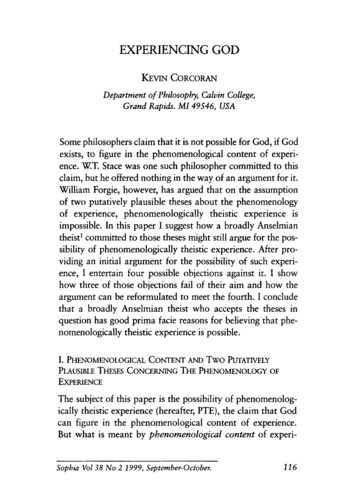
Transcription
EXPERIENCING GODKEVIN CORCORANDepartment of Philosophy, Calvin College,Grand Rapids. M149546, USASome philosophers claim that it is not possible for God, if Godexists, to figure in the phenomenological content of experience. W.T. Stace was one such philosopher committed to thisclaim, but he offered nothing in the way of an argument for it.William Forgie, however, has argued that on the assumptionof two putatively plausible theses about the phenomenologyof experience, phenomenologically theistic experience isimpossible. In this paper I suggest how a broadly Anselmiantheist I committed to those theses might still argue for the possibility of phenomenologically theistic experience. After providing an initial argument for the possibility of such experience, I entertain four possible objections against it. I showhow three of those objections fail of their aim and how theargument can be reformulated to meet the fourth. I concludethat a broadly Anselmian theist who accepts the theses inquestion has good prima facie reasons for believing that phenomenologically theistic experience is possible.I. PHENOMENOLOGICALCONTENT AND TWO PUTATIVELYPLAUSIBLETHESES CONCERNING THE PHENOMENOLOGYOFEXPERIENCEThe subject of this paper is the possibility of phenomenologically theistic experience (hereafter, PTE), the claim that Godcan figure in the phenomenological content of experience.But what is meant by phenomenological content of experi-Sophia Vo138 No 2 1999, September-October.116
ence? As a first approximation we might distinguish how anexperience represents the world from the actual object orobjects represented. For example, an experience may represent the world, or some aspect of the world, as red and round.The reddishness and roundishness might thus at least partlyconstitute the phenomenological content of an experience ofan apple, say. By phenomenological content, then, one mightjust mean the sensuous or imagistic representational elementsof experience.2But one might cast the phenomenological net wider. Onemight hold that upon one's being appeared to redly androundly in the case of perceiving a red apple there might alsobe, in addition to the reddishness and roundishness that arephenomenologically presented, affective phenomenologicalaspects of the experience. For example, one might desire theapple or perhaps be repulsed by it. Moreover, one mightinclude, in addition to the sensuous and affective phenomenological aspects of experience, the doxastic elements thatfigure among the phenomenological content of many experiences. For example, when I perceive an apple, in addition tothe affective and sensous elements, there might also be theimpulsion with respect to a certain proposition (that I see anapple) to believe that that proposition is true, that the worldis the way the proposition represents it.3 So one might includein the phenomenological content of experience not just thesensuous or imagistic representational elements, but also theaffective and doxastic.By phenomenological content I mean to include all ofthe the 'what it's like' features that are presented to consciousness in the having of an experience, the sensuous, affective and doxastic. Many who deny that PTE is possible, onthe other hand, seem to restrict what is to be counted amongphenomenological content to the sensous and imagistic represenational elements of experience. But their argumentsagainst the possibility of PTE do not depend on this claim.4117
On what sorts of claims then do such arguments depend?One very compelling argument against the possibility of PTEdepends partly on the following thesisP: An experience E is phenomenologically of x (where xis an individual) if and only if the content of E includesthe manifestation of F, where F is a property x alone possibly possesses.William Forgie assumes P (or some variant of it) inobjecting to the possibility of PTE. s We will examine Forgie'sobjection in due course. In any event, P is to be understood asan internal requirement on the phenomenological content ofexperience. For example, if an experience is said to be phenomenologically of Richard Nixon, then among the phenomenological content of that putative experience of Nixon mustbe the manifestation of some property that Nixon alone possibly possesses. If the manifestation of a uniquely identifyingproperty is not among the phenomenological content of someexperience, then that experience is not phenomenologically ofsome particular individual as opposed to some individual orother, each of whom might equally 'fit' the content of theexperience. Thus an experience E is phenomenologically of xif and only if E includes the manifestation of F and it is impossible for F to be exemplified by some y numerically distinctfrom x. 6Our concern here shall be with the phenomenology ofveridical experience. I will follow Forgie and others here andmean that an experience is veridical if and only if that experience is of an actually existing, mind-independent object andis not a hallucinatory or otherwise illusory experience.Moreover, I will assume that the actual objects of veridicalperceptual experiences possess properties, and thus causalpowers, in virtue of which they are responsible for the phenomenological content of those experiences.7 On this construal of veridical, the following are both possible:118
(A) two veridical perceptual experiences of the sameobject differ in phenomenological content, and(B) veridicalperceptual experiencesof numericallydistinctobjects share the same phenomenologicalcontent(A) poses no special problems for the possibility of PTE.Assuming P, two veridical experiences of God may differ asmuch as you like in phenomenological content so long as thecontent of each includes the manifestation of a uniquelyinstantiable property of God's. (B) on the other hand entailsthe possibility of an experience being phenomenologically ofGod even if the manifestation of no uniquely instantiableproperty of God's is included in the phenomenological content of the experience. B is ruled out by P. In fact, WilliamForgie goes further than P and stipulates thatP: If an experience is phenomenologically of x (where x isan individual) and is also veridical, then the phenomenological content of that experience of x must metaphysically determine the actual object of that experienceIt is the conjunction of P and P, Forgie believes, that renders PTE impossible,s P requires that in the case of a veridical perceptual experience phenomenologically of an individual, say Richard Nixon, it be metaphysically impossible for anumerically distinct individual, say Ed Sullivan, to cause anexperience phenomenologically indistinguishable from thatof Nixon. Thus when an experience E includes the manifestation of F among its phenomenological content (where F is aproperty x alone possibly possesses) and E is veridical, and itis impossible for a numerically distinct object y to cause anexperience phenomenologically indistinguishable from x,then P and P are jointly satisfied.The claim then is this. If an experience is veridical and isphenomenologically of something having property F (and phenomenologically of nothing else), where property F is a property capable of being instantiated by more than one possible119
individual, then nothing in the content of that experience willguarantee that its actual object is any particular one of themany possible individuals capable of exemplifying that property. On the other hand, if an experience is veridical and its phenomenological content includes the manifestation of someproperty uniquely possessed by a particular individual suchthat the actual object of that experience must be the individualwho alone can have the uniquely instanfiable property in question, then that experience is phenomenologically of the uniqueindividual possessing that property. Forgie does not believe thatany experience of God could be such that it is not possible thatan experience of something else be phenomenologically indistinguishable from that experience of God. 9 So he claims thatphenomenologically theistic experience is impossible. We shallconsider Forgie's argument for this claim shortly.I have argued elsewhere against both P and P and againstthe claim based on them that PTE is impossible. 1 In fact, Pand P strike me as monumentally implausible. Still, I believea broadly Anselmian theist committed to those theses canmotivate a plausible argument for the possibility of PTE.Substituting 'God' for 'some specific individual' and 'it,'in P, the Anselmian might offer the following argument forthe possibility of PTE, using P and P as premises.II. AN ARGUMENT FOR THE POSSIBILITYOF P T E(i)If an experience is phenomenologically of x (wherex is an individual) and is also veridical, then the phenomenological content of that experience of x mustmetaphysically determine the actual object of thatexperience(ii) An experience E is phenomenologically of God ifand only if the content of E includes the manifestation of F, where F is a property God alone possiblypossesses.(iii) God alone possibly possesses omnipotence.120
Therefore,(iv) If some experience is veridical and is phenomenologically of something manifesting omnipotence, then the object of that experience must beGod.Therefore,(v)According to (i), if some experience is veridical andis phenomenologically of something manfestingomnipotence, then such an experience is phenomenologically of God.This argument is valid. But what are we to make ofpremise (iii) and, therefore, the claim in (iv) that the object ofsuch an experience must be God? The Anselmian has reasonsfor believing both that (a) God is a necessary being, and thusexists at all possible worlds, and (b) God possesses omnipotence essentially.11 Arguments for (a) can be found inAnselm's own writings or, more recently, in the works ofAlvin Plantinga) 2 That God possesses omnipotence essentially follows both from the concept of God as that of a maximally perfect being, and from the plausible belief that poweris a perfection. Therefore, at whatever worlds God exists(which is all possible worlds if God is a necessary being), Godwill possess all perfection-making properties and do so maximally. 13There is good reason also to believe that the only objectthat possibly possesses omnipotence is God, since it is plausible to suppose that there cannot simultaneously be twoomnipotent beings. Since on our Anselmian reading God is anessentially omnipotent and necessarily existent being, theobject of such an experience under consideration would haveto be God, could not possibly not be God. Given (a) and (b),and on the basis of P and P, it is rational for the Anselmian tobelieve that PTE is possible.121
III. OBJECTIONS AND REPLIESThere are four possible objections to this Anselmian argument that I want to consider. Before examining an objectionthat may immediately strike the reader, to wit, that the manifestation of omnipotence cannot figure in the phenomenological content of an experience, I want to examine two otherobjections of equal importance. The first objection consists inan appeal to the concept of God. The classical Western conception of God minimally consists in that of a being that fallsunder no one of the sensory modalities. It might be arguedthat in virtue of God's nature as an immaterial being a PTEappears conceptually incoherent. God, if such there be, is simply not the kind of object that can enter into experience. TMLet me begin by pointing out that there are places in therelevant literature where mystics include sensory content intheir phenomenological descriptions of putative theistic experiences. Moreover, William Alston has recently provided reasons for why it is not inconceivable that God, if God exists,should be presented sensorily even though God's nature issuch as to be devoid of sensory qualities? 5The main difficulty with the objection, however, lies inits assumption that all, or even most, theistic experiences aresensory experiences. Not so. Most reports of putative theisticexperiences consist in accounts of non-sensory experience.Descriptions of such experiences uniformly depict God aspresenting God's self non-sensorily to the experient's consciousness in a way analogous to the way ordinary physicalobjects are presented to, or given in, sensory experience, i.e.,involuntarily, and such that the qualitative features of theexperience differ markedly from, say, thinking or imagining.The concept of God as that of an immaterial being logically precludes the possibility of theistic experience only if itis assumed both that an immaterial being cannot present itselfsensorily in experience and all experiences are sensory experiences. The first of these claims has been addressed by122
Alston. The claim that all experiences are sensory experiencesdoes not, to my lights, have the same epistemic status as'1 1 2,' and so is in need of some justification or argument.I k n o w of no such argument.The second possible objection to the possibility of PTEis one raised by William Forgie. The objection is predicatedon the claim that the omni-properties classically attributed toGod are not uniquely instantiable properties.Take 'being omnipotent,' 'being omniscient," 'being allgood,' or 'being the creator of the heavens and the earth.'Even if these properties are instantiated in this world bya certain individual, A, there is another possible world inwhich they are instantiated by a numerically distinct individual, B.16If this is so, then premise (ii) in the original argument isnot satisfied in the case of God, and thus it is possible that anexperience of something manifesting omnipotence not be anexperience of something identical with God. And givenpremise (i) it would follow that such an experience is not phenomenologically of God. Forgie's objection may be represented as follows.Forgie's Argument(i)If an experience is phenomenologically of x (wherex is an individual) and is also veri
EXPERIENCING GOD KEVIN CORCORAN Department of Philosophy, Calvin College, Grand Rapids. M149546, USA Some philosophers claim that it is not possible for God, if God exists, to figure in the phenomenological content of experi- ence. W.T. Stace was one such philosopher committed to this claim, but he offered nothing in the way of an argument for it. William Forgie, however, has argued that on .
